-
01-01-2015
Low birth weight in a municipality in the southeast region of Brazil
Revista Brasileira de Enfermagem. 2015;68(6):1169-1175
Abstract
Low birth weight in a municipality in the southeast region of Brazil
Revista Brasileira de Enfermagem. 2015;68(6):1169-1175
DOI 10.1590/0034-7167.2015680624i
Views0See moreABSTRACT
Objective:
to identify the prevalence of low birth weight in the city of São Paulo.
Method:
epidemiological cross-sectional study with data collected by means of the Brazilian Live Birth Information System related to births occurred in the city of São Paulo between 2007 and 2013. Maternal, gestational, childbirth, and neonatal variables were analyzed descriptively and by association.
Results:
9.65% (1,342,655) of live births were underweight (mean of 3234.55 grams in the term group and 2312.17 in the pre-term group) with a mean maternal age of 27.53 years old. The risk factors identified include maternal age, not having a partner, low maternal level of education, other race rather than white, pre-term pregnancy, multiple births, low number of prenatal check-ups, and cesarean delivery.
Conclusion:
knowledge of this evidence favors planning the care provided by defining strategies to reduce it and consequently improve maternal and infant health care.

-
01-01-2015
Gait speed and cognitive score in elderly users of the primary care service
Revista Brasileira de Enfermagem. 2015;68(6):1163-1168
Abstract
Gait speed and cognitive score in elderly users of the primary care service
Revista Brasileira de Enfermagem. 2015;68(6):1163-1168
DOI 10.1590/0034-7167.2015680623i
Views0See moreABSTRACT
Objective:
to investigate the association between gait speed and the cognitive score of elderly patients enrolled in a Basic Health Unit.
Method:
a quantitative cross-sectional study with 203 elderly, a sample calculated based on the estimated population proportion. Data were collected using a sociodemographic and clinical questionnaire, gait speed test (GS) and the Mini Mental State Examination (MMSE).
Results:
the illiterate patients had a mean MMSE=19.33(±3.7) and GS = 0.76m/s (±0.3); those with low/medium education had a MMSE = 25.43(±2.8) and GS = 0.92m/s (±0.2); and the elderly with higher education had a MMSE = 27.33(±2.9) and GS=1.12m/s (±0.3).There was a weak correlation (R2=00354) between gait speed and cognitive score, with statistical significance (Prob>F = 0.0072) and a positive linear trend.
Conclusion:
the better cognitive score the higher the gait speed; the illiterate elderly were those with lower gait speed, thereby indicating a poorer physical performance.
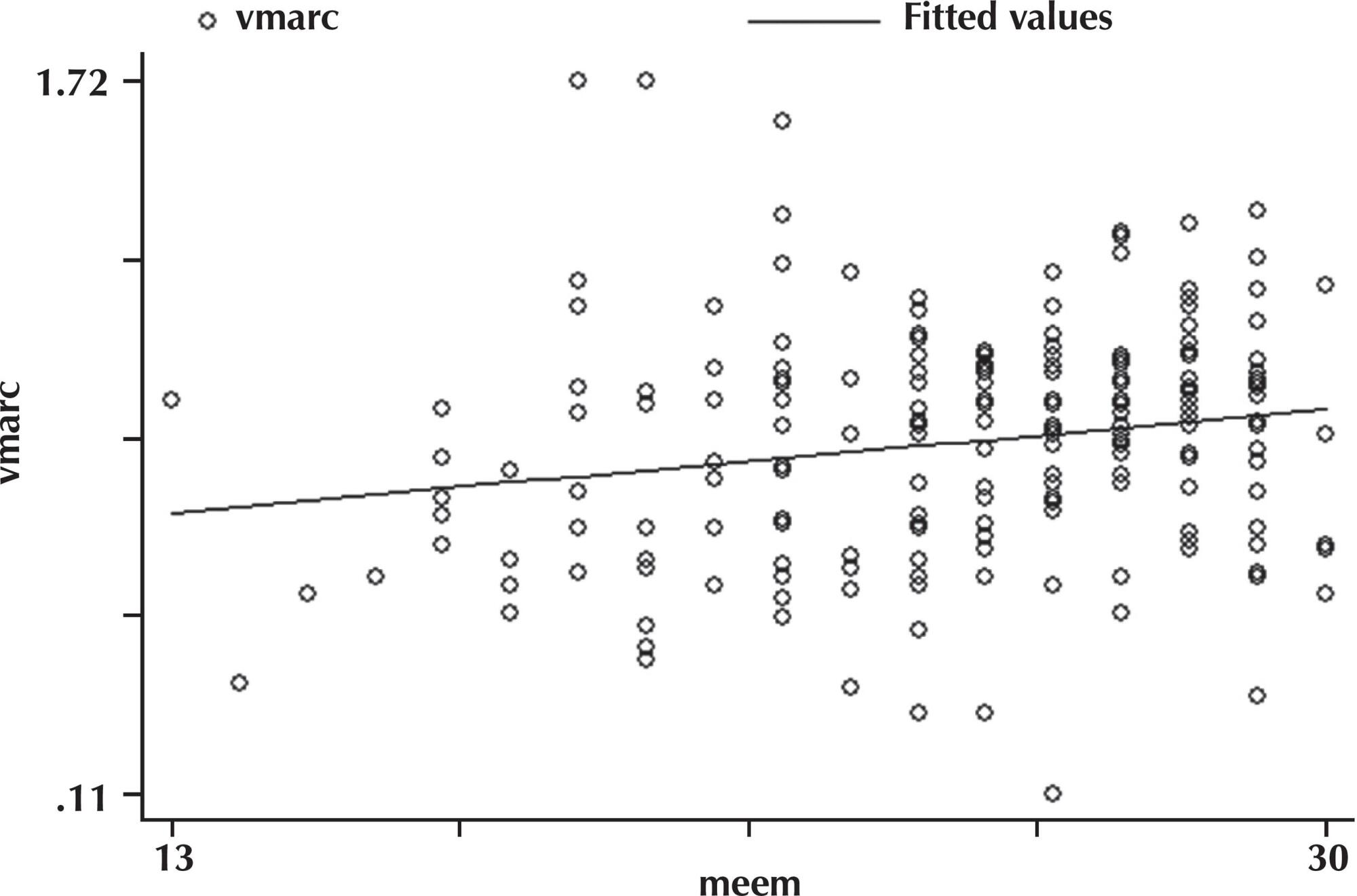
-
01-01-2015
Fluid and dietary restriction’s efficacy on chronic kidney disease patients in hemodialysis
Revista Brasileira de Enfermagem. 2015;68(6):1154-1162
Abstract
Fluid and dietary restriction’s efficacy on chronic kidney disease patients in hemodialysis
Revista Brasileira de Enfermagem. 2015;68(6):1154-1162
DOI 10.1590/0034-7167.2015680622i
Views0See moreABSTRACT
Objective:
to identify self-care measures to manage fluid and dietary restrictions and assess their effectiveness.
Method:
descriptive-correlational study and cluster analysis with 254 chronic renal failure patients on regular hemodialysis program, handled by hemodiafiltration. We evaluated the effectiveness of self-care by interdialytic weight gain (IWG) and by potassium and phosphorus serum pre-dialysis serum levels.
Results:
several self-care measures were significantly correlated with a lower IWG and a lower level of pre-dialysis phosphorus. Patients most often use measures to reduce salt consumption than measures to restrict potassium and dietary phosphorus. The spouse provides important support dietary management. Subjects who use more often the self-care measure are mostly female, are older, less IWG and have a higher Kt/V.
Conclusion:
these results can contribute to the nursing educational support.
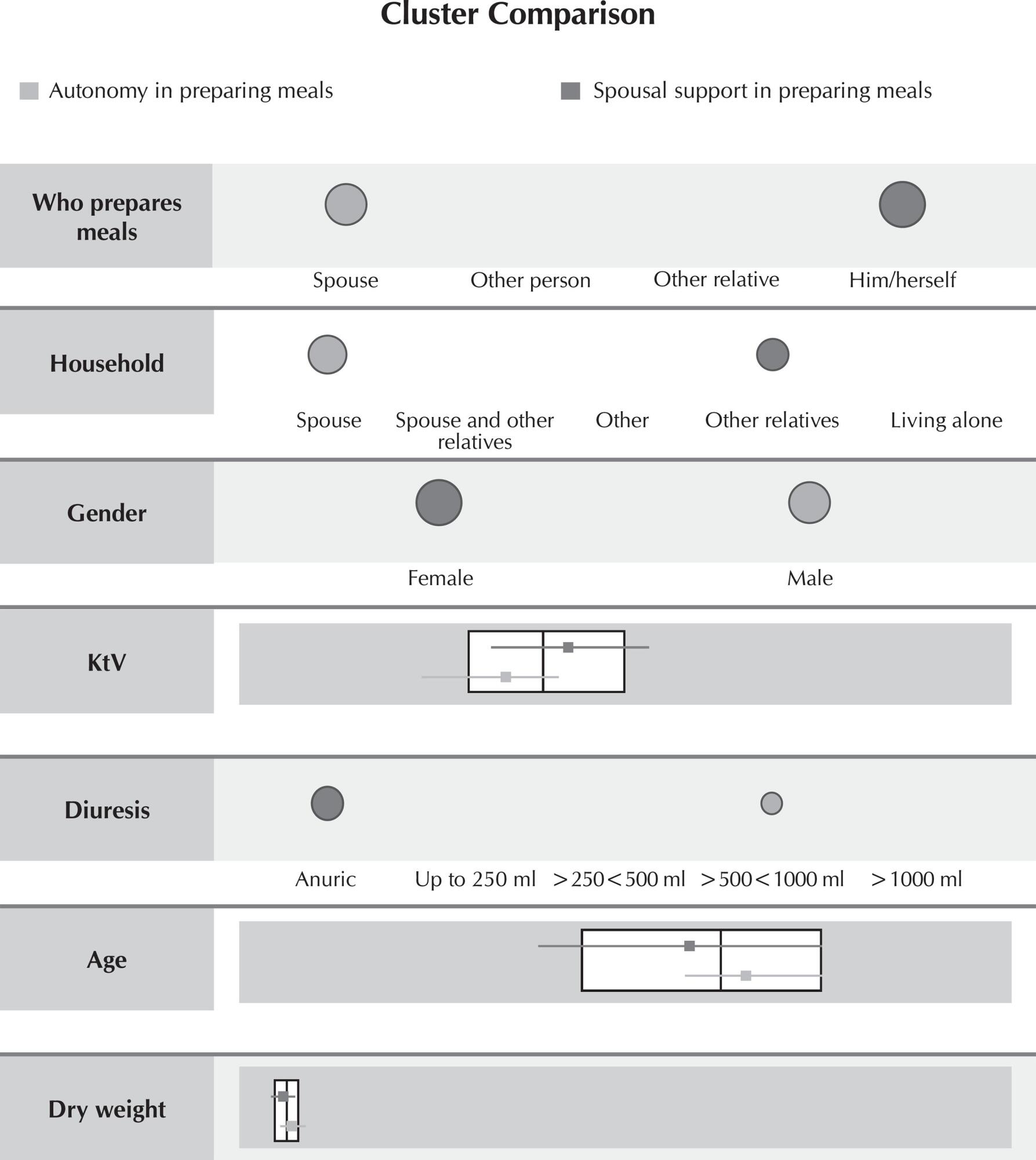
-
01-01-2015
Validation of newborn positioning protocol in Intensive Care Unit
Revista Brasileira de Enfermagem. 2015;68(6):1147-1153
Abstract
Validation of newborn positioning protocol in Intensive Care Unit
Revista Brasileira de Enfermagem. 2015;68(6):1147-1153
DOI 10.1590/0034-7167.2015680621i
Views0See moreRESEARCH
Objective:
to verify the positioning indications of newborn sand build a standard operating procedure protocol for newborn positioning in Neonatal Intensive Care Unit (NICU).
Method:
for protocol validation, the Delphi technique was used ,in which expert nurses in the field reviewed the proposed procedure.
Results:
we present the results of this validation in a protocol form, to contribute to the discussion about newborn positioning in NICU and standardization of nursing care related to positioning. We evaluated ten indicators, in which there was agreementof100.0% in seven, and of80% in three, above the 60% recommended by the validation technique.
Conclusion:
given the importance of newborn positioning in NICU for its neuromuscular development, this study contributes to the adoption of an evidence-based practice for nursing.
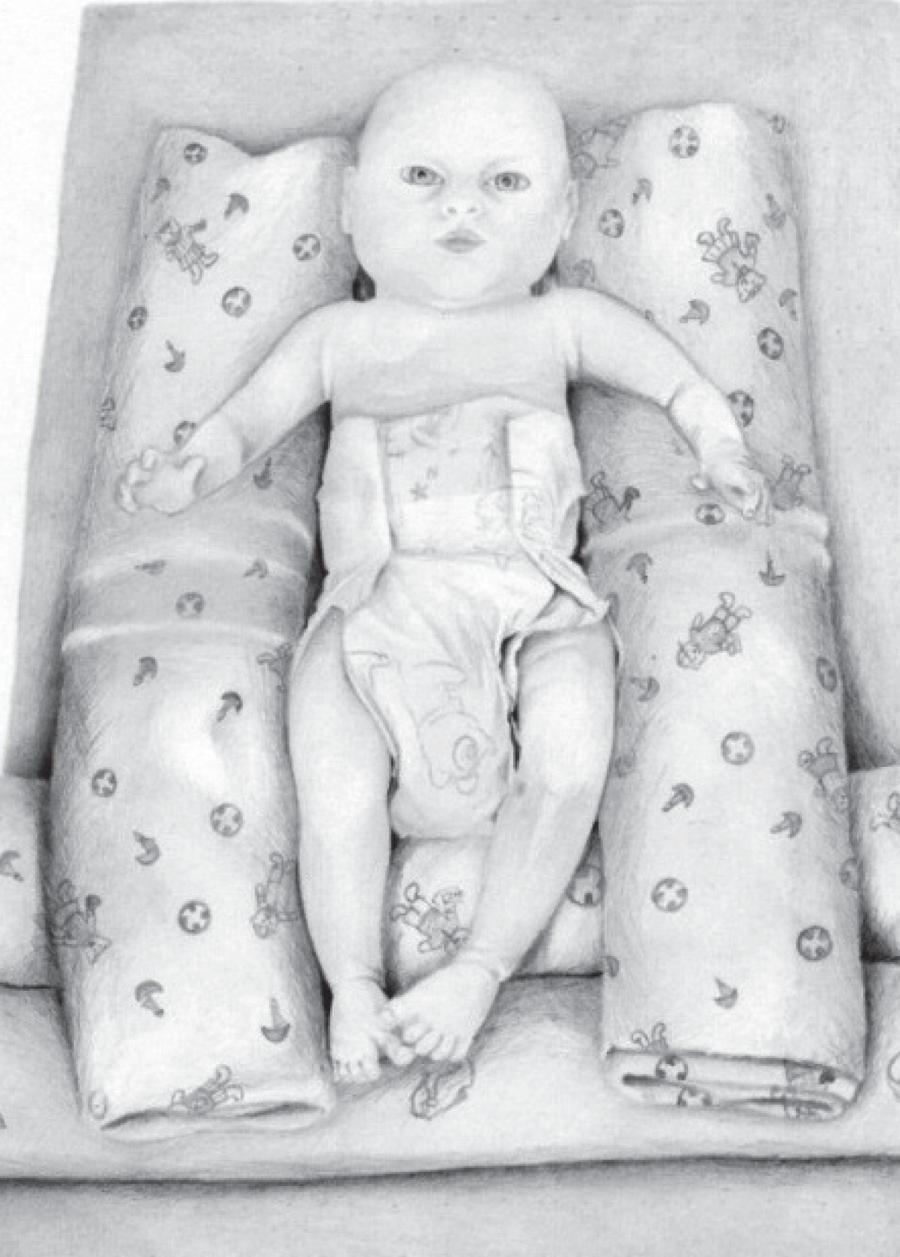
-
01-01-2015
Patient safety culture in a bone marrow transplantation unit
Revista Brasileira de Enfermagem. 2015;68(6):1139-1146
Abstract
Patient safety culture in a bone marrow transplantation unit
Revista Brasileira de Enfermagem. 2015;68(6):1139-1146
DOI 10.1590/0034-7167.2015680620i
Views0See moreABSTRACT
Objective:
evaluate the patient safety culture in the perspective of health professionals from a bone marrow transplantation unit of an oncology research center, at a reference hospital for cancer treatment in Santa Catarina, Brazil.
Method:
a quantitative cross-sectional study that used the Safety Attitudes Questionnaire was conducted between August and September 2013. The study analyzed 33 professional surveys. Statistical data analysis used descriptive and inferential statistics.
Results:
among the dimensions analyzed, only “job satisfaction” reached a mean score above 75, considered positive in terms of patient safety culture.
Conclusion:
the dimensions of safety culture present in the survey have to be valued by professionals and managers to allow safe patient care.
-
01-01-2015
Job satisfaction of nursing staff in a university hospital
Revista Brasileira de Enfermagem. 2015;68(6):1130-1138
Abstract
Job satisfaction of nursing staff in a university hospital
Revista Brasileira de Enfermagem. 2015;68(6):1130-1138
DOI 10.1590/0034-7167.2015680619i
Views0See moreABSTRACT
Objective:
identify the determinants of job satisfaction of the nursing staff of a public university hospital.
Method:
secondary study with mixed data approach and simple and multiple linear regression. A total of 115 subjects participated in the study, 41 nurses and 74 nursing assistants and technicians. The data collection occurred in 2013 using the QST-Caism questionnaire.
Results:
education, hierarchical level and workplace constitute job satisfaction determinants. However, age, gender, job and work period did not show this relationship. More educated workers held low job satisfaction if exercised not graduated nursing functions.
Conclusion:
graduated workers who perform high school functions are more unsatisfied than those who have high school function and qualification.
-
01-01-2015
Medical waste in mobile prehospital care
Revista Brasileira de Enfermagem. 2015;68(6):1122-1129
Abstract
Medical waste in mobile prehospital care
Revista Brasileira de Enfermagem. 2015;68(6):1122-1129
DOI 10.1590/0034-7167.2015680618i
Views0See moreABSTRACT
Objective:
the objective of this study is to identify how Medical Waste (MW) is managed in Mobile Prehospital Care (MPC) services in the state of São Paulo as well as characterize and quantify this waste.
Method:
exploratory and descriptive field study with data collection based on the methodology proposed by the Pan American Health Organization (PAHO), which was conducted over eight consecutive days to identify the production and characteristics of generated waste.
Results:
it was found that the MW management of the MPC is not yet in line with the requirements of RDC 306/04, which could affect the occupational safety of workers, patients, the community, and the environment.
Conclusion:
it is recommended for the health managers to focus on this issue. The lack of studies with regard to MPC also indicates the need for further studies on the waste management.

-
01-01-2015
Severe lactational mastitis: particularities from admission
Revista Brasileira de Enfermagem. 2015;68(6):1116-1121
Abstract
Severe lactational mastitis: particularities from admission
Revista Brasileira de Enfermagem. 2015;68(6):1116-1121
DOI 10.1590/0034-7167.2015680617i
Views0See moreABSTRACT
Objective:
to identify characteristics of women who have suffered severe lactational mastitis.
Method:
a descriptive, retrospective, documentary, quantitative study was performed. Data were collected from patient records of 114 hospitalized women from January of 2009 to December of 2013. Data were analyzed by using descriptive statistics.
Results:
a higher percentage of severe lactational mastitis was found in young, primiparous women who had completed high school, who had no partner, and did not have a job; 96.5% of women had breast complications before admission and remained hospitalized an average of 4.4 days; at discharge, 23.7% of women had weaned their infants.
Conclusion:
this study showed that severe lactational mastitis can cause great harm to the woman and the baby.
-
12-04-2023
A cronicidade e o seu impacto na saúde do trabalhador: uma chamada para ações concretas
Revista Brasileira de Enfermagem. 2023;76:e76suppl301
Abstract
A cronicidade e o seu impacto na saúde do trabalhador: uma chamada para ações concretas
Revista Brasileira de Enfermagem. 2023;76:e76suppl301
DOI 10.1590/0034-7167.202376suppl301pt
Views0A relação entre cronicidade e trabalho tem sido uma preocupação crescente na sociedade contemporânea. À medida que o número de doenças crônicas aumenta em todo o mundo, é fundamental compreender como essas condições impactam a saúde dos trabalhadores(). Neste editorial, exploraremos os impactos da cronicidade na saúde do trabalhador, destacando dados da Carga Global de […]See more -
12-04-2023
Chronicity and its impact on workers’ health: a call for concrete actions
Revista Brasileira de Enfermagem. 2023;76:e76suppl301
Abstract
Chronicity and its impact on workers’ health: a call for concrete actions
Revista Brasileira de Enfermagem. 2023;76:e76suppl301
DOI 10.1590/0034-7167.202376suppl301
Views0The relationship between chronicity and work has been a growing concern in contemporary society. As the number of chronic illnesses increases around the world, it is critical to understand how these conditions impact workers’ health(). In this editorial, we will explore the impacts of chronicity on workers’ health, highlighting data from the Global Burden of […]See more -
12-04-2023
General Law on Personal Data Protection and applicability to Nursing
Revista Brasileira de Enfermagem. 2023;76:e20230126
Abstract
General Law on Personal Data Protection and applicability to Nursing
Revista Brasileira de Enfermagem. 2023;76:e20230126
DOI 10.1590/0034-7167-2023-0126
Views0See moreABSTRACT
Objectives:
to reflect on the impacts of the General Personal Data Protection Law on Nursing practice.
Methods:
reflection article, through the intentional collection of materials relating to the topic.
Results:
legislation regulates confidentiality, processing and data sharing, requiring institutional protection measures. The nursing team is responsible for acting preventively, both in care and in the management role, in order to avoid the misuse of the patient’s personal data. The law allows academic research to be carried out as long as the purpose is clear, data collection occurs with an explicit purpose and data is anonymized.
Final Considerations:
although the General Personal Data Protection Law requires greater care in relation to data processing, it is established on precepts of good faith and respect for the rights of the individual, concepts aligned with the nursing code of ethics.

-
REVIEW12-04-2023
Supervision of professional nursing practice in Brazil: a scoping review
Revista Brasileira de Enfermagem. 2023;76:e20230077
Abstract
REVIEWSupervision of professional nursing practice in Brazil: a scoping review
Revista Brasileira de Enfermagem. 2023;76:e20230077
DOI 10.1590/0034-7167-2023-0077
Views0See moreABSTRACT
Objectives:
to map studies that analyze the audit process of nursing councils.
Methods:
this is a scoping review, anchored in the JBI framework, with the guiding question: what is the evidence of the audit process of legal practice of nursing by class councils (COFEN/COREN system)? The searches were carried out in October and November 2022 without limitation of language and year.
Results:
of the 9 selected studies, all are Brazilian and published from 2014 onwards. Among the topics addressed are the role, challenges, costs and difficulties in nurse auditors’ daily work process, in addition to the contribution of the audit sector in Brazil.
Conclusions:
the studies gathered discuss aspects related to costs, challenges and difficulties, but there is no focus on corrective, disciplinary and educational activities as well as little is said about the audit process, its reporting, referral and outcomes.

-
ORIGINAL ARTICLE12-04-2023
Overview of nursing ethics teaching in Brazilian public higher education institutions
Revista Brasileira de Enfermagem. 2023;76:e20220808
Abstract
ORIGINAL ARTICLEOverview of nursing ethics teaching in Brazilian public higher education institutions
Revista Brasileira de Enfermagem. 2023;76:e20220808
DOI 10.1590/0034-7167-2022-0808
Views0See moreABSTRACT
Objectives:
to outline the teaching of ethics in undergraduate Nursing programs in Brazilian public higher education institutions.
Methods:
descriptive and exploratory study, carried out through the documentary analysis of pedagogical projects of undergraduate Nursing programs in Brazil.
Results:
153 active undergraduate Nursing programs were found, of which 106 provide the pedagogical project. In addition to deontological teaching, the teaching of ethics was identified in a transversal way associated with themes such as Social Context, Hospital and Community Care, Pharmacology, Systematization of Nursing Care, Surgical Nursing, Epidemiology, Palliative Care, Management in Nursing, Diversity, Women’s, Children’s, Adolescent’s, Adult’s and Older People’s Health, and Mental Health.
Final Considerations:
the challenge in teaching nursing ethics is its integration with each action of caring, teaching and managing.

-
12-04-2023
La ética de la atención de enfermería a las personas transgénero
Revista Brasileira de Enfermagem. 2023;76:e20220797
Abstract
La ética de la atención de enfermería a las personas transgénero
Revista Brasileira de Enfermagem. 2023;76:e20220797
DOI 10.1590/0034-7167-2022-0797es
Views0See moreRESUMEN
Objetivos:
debatir sobre aspectos éticos en la atención de enfermería a personas transgénero.
Métodos:
estudio reflexivo fundamentado sobre los dilemas que se plantean en los cuidados de enfermería a personas transgénero. El relato se ha estructurado en torno a los cuatro principios bioéticos.
Resultados:
la atención sanitaria a las personas trans es compleja, transversal a muchos dispositivos y especialidades y longitudinal en el tiempo por lo que precisa de la actuación coordinada. Existe un marco ético en el que se encuadran los cuidados de enfermería que se precisan en la atención a este colectivo.
Consideraciones Finales:
la enfermera como agente de salud puede asumir diversas líneas generales en la atención a pacientes transgénero. Para ello, se debe brindar formación adicional no solo a los profesionales, también a los estudiantes de enfermería y de las demás ciencias de la salud.
-
12-04-2023
Ethical dilemmas at the end of life: a reflection from the Philosophical Perspective of Luigina Mortari
Revista Brasileira de Enfermagem. 2023;76:e20220759
Abstract
Ethical dilemmas at the end of life: a reflection from the Philosophical Perspective of Luigina Mortari
Revista Brasileira de Enfermagem. 2023;76:e20220759
DOI 10.1590/0034-7167-2022-0759
Views0See moreABSTRACT
Objectives:
to reflect on the ethical dilemmas involved in the care of patients at the end of their lives.
Methods:
this is a theoretical-reflective study based on the ethics of care proposed by Luigina Mortari.
Results:
discussing care involves addressing the ways of being inherent to human existence and understanding the unique characteristics of this condition. Ethical care constitutes an action driven by interest in the other and by the perception of their need. Ethical dilemmas are a part of end-of-life care, making it essential to maintain respectful assistance that considers the patient’s autonomy, using strategies for expressing their wishes, and ensuring continuous clear and empathetic communication among all those involved in providing care.
Final Considerations:
issues related to being, stemming from one’s reality of dependency and vulnerability, contribute to the emergence of ethical dilemmas present in care actions.
-
ORIGINAL ARTICLE07-29-2024
Primary Health Care in transitional care of people with stroke
Revista Brasileira de Enfermagem. 2024;77(3):e20230468
Abstract
ORIGINAL ARTICLEPrimary Health Care in transitional care of people with stroke
Revista Brasileira de Enfermagem. 2024;77(3):e20230468
DOI 10.1590/0034-7167-2024-0468
Views0See moreABSTRACT
Objectives:
to understand the role of Primary Health Care teams in caring for people with stroke after hospital discharge.
Methods:
single case study, with integrated units of analysis, with a qualitative approach. Data triangulation occurred through interviews with professionals and family caregivers involved in transition of care, in addition to direct observations in rounds and document analysis. For the analyses, the analytical strategies of theoretical propositions and construction of explanations were used, with the help of ATLAS.ti®.
Results:
the importance of counter-referral, the role of community health workers and the multidisciplinary team, health promotion, secondary prevention, home visits as a visceral attribute and nurses as care managers are evident.
Final Considerations:
the high demand on teams and the Social Determinants of Health interfere with adequate continuity of care. Transitional care programs that enable continuity of care are recommended.
-
ORIGINAL ARTICLE07-29-2024
Completeness of variables in Hospital-Based Cancer Registries for prostatic malignant neoplasm
Revista Brasileira de Enfermagem. 2024;77(3):e20230467
Abstract
ORIGINAL ARTICLECompleteness of variables in Hospital-Based Cancer Registries for prostatic malignant neoplasm
Revista Brasileira de Enfermagem. 2024;77(3):e20230467
DOI 10.1590/0034-7167-2023-0467
Views0See moreABSTRACT
Objectives:
to analyze the completeness of variables from Hospital-Based Cancer Registries of cases of prostate neoplasm in the Oncology Care Network of a Brazilian state between 2000 and 2020.
Methods:
an ecological time series study, based on secondary data on prostate cancer Hospital-Based Cancer Registries prostate. Data incompleteness was classified as excellent (<5%), good (between 5%-10%), fair (10%-20%), poor (20%-50%) and very poor (>50%), according to the percentage of lack of information.
Results:
there were 13,519 cases of prostate cancer in the Hospital-Based Cancer Registries analyzed. The variables “family history of cancer” (p<0.001), “alcoholism” (p<0.001), “smoking” (p<0.001), “TNM staging” (p<0.001) had a decreasing trend, while “clinical start of treatment” (p<0.001), “origin” (p=0.008) and “occupation” (p<0.001) indicated an increasing trend.
Conclusions:
most Hospital-Based Cancer Registries variables showed excellent completeness, but important variables had high percentages of incompleteness, such as TNM and clinical staging, in addition to alcoholism and smoking.
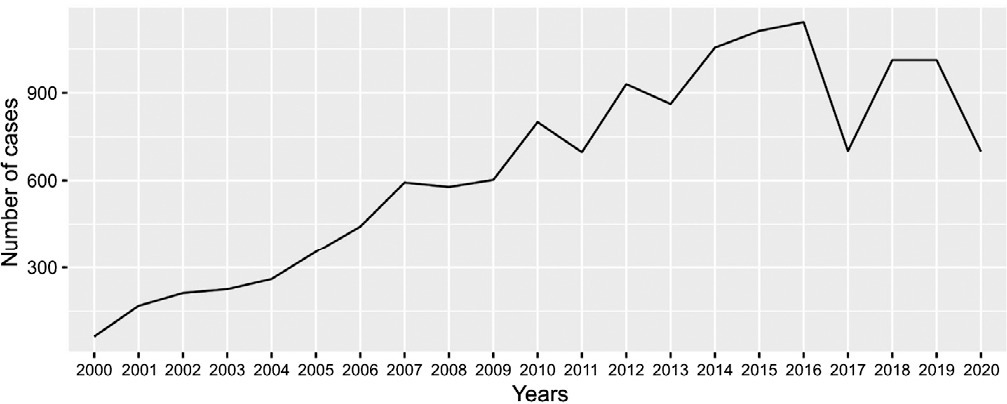
-
ORIGINAL ARTICLE07-29-2024
Disrupted mother-fetus dyad risk in high-risk pregnancies: a Middle-Range Theory
Revista Brasileira de Enfermagem. 2024;77(3):e20230464
Abstract
ORIGINAL ARTICLEDisrupted mother-fetus dyad risk in high-risk pregnancies: a Middle-Range Theory
Revista Brasileira de Enfermagem. 2024;77(3):e20230464
DOI 10.1590/0034-7167-2023-0464
Views0See moreABSTRACT
Objectives:
to develop and evaluate a Middle-Range Theory for the nursing diagnosis “Disrupted Mother-Fetus Dyad Risk” in high-risk pregnancies.
Methods:
this methodological study was conducted in two stages: theory development and evaluation. Dorothea Orem’s General Nursing Model was used as the theoretical-conceptual foundation. Evaluation was conducted using the Delphi method with seven judges, and consensus was achieved when the Content Validity Index of the evaluated items was ≥ 0.80.
Results:
the theory identified 20 elements of the nursing diagnosis “Disrupted Mother-Fetus Dyad Risk” (10 risk factors, 4 at-risk populations, and 6 associated conditions), 14 propositions, and 1 pictogram. After two rounds of evaluation, the theory was considered consistent, with consensus reached for all items, each achieving a Content Validity Index ≥ 0.80.
Conclusions:
the Middle-Range Theory included biopsychosocial factors explaining the nursing phenomenon “Disrupted Mother-Fetus Dyad Risk,” which aids in nurses’ diagnostic reasoning.
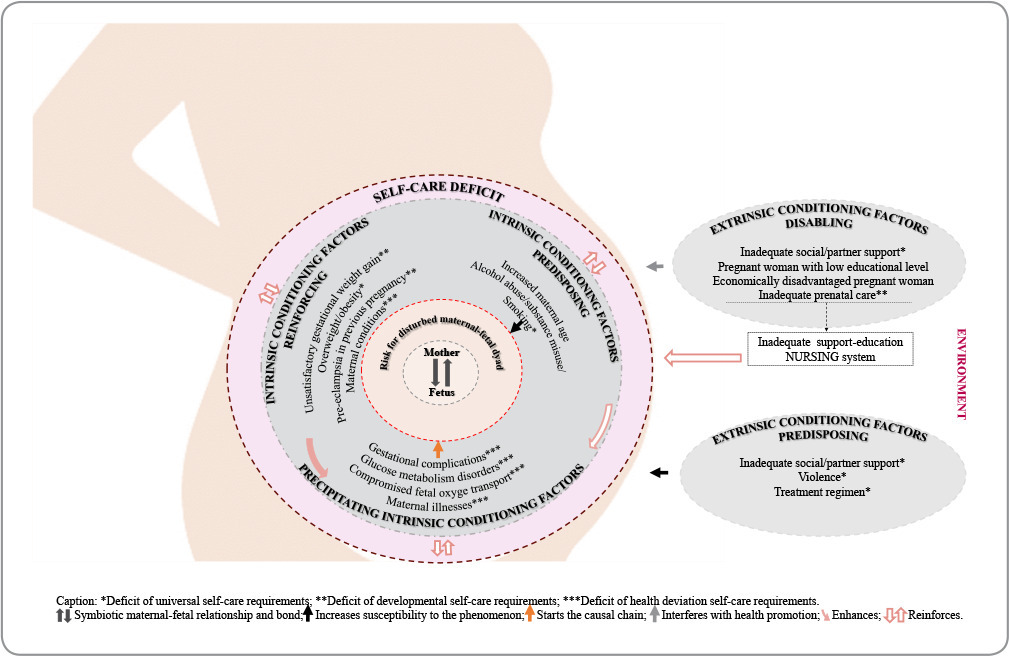
-
ORIGINAL ARTICLE07-29-2024
Mental health of parents of children and adolescents who require special health care
Revista Brasileira de Enfermagem. 2024;77(3):e20230457
Abstract
ORIGINAL ARTICLEMental health of parents of children and adolescents who require special health care
Revista Brasileira de Enfermagem. 2024;77(3):e20230457
DOI 10.1590/0034-7167-2023-0457
Views0See moreABSTRACT
Objective:
To identify the manifestations presented by parents of children and adolescents who require special health attention that can impact their mental health.
Methods:
exploratory, qualitative research, based on the concept of vulnerability, with data collection carried out through interviews with 18 parents of children and adolescents with special health care needs, hospitalized in the pediatric ward of a hospital in Paraná, between May/2017 and May/ 2018. Data analyzed by inductive thematic analysis.
Results:
parents experienced situations of vulnerability when providing care at home, with repercussions on their mental health, expressed by manifestations of lack of protection, anxiety and depression.
Final considerations:
It is important that health professionals seek to expand actions to promote care and reduce situations that generate threats, insecurities, concerns and damage to the health of parents, which can impact and further weaken care for children and adolescents who need attention especially health.
-
REVIEW07-29-2024
Profile of scientific production on nursing technology construction, validity and application: a bibliometric study
Revista Brasileira de Enfermagem. 2024;77(3):e20230452
Abstract
REVIEWProfile of scientific production on nursing technology construction, validity and application: a bibliometric study
Revista Brasileira de Enfermagem. 2024;77(3):e20230452
DOI 10.1590/0034-7167-2023-0452
Views1See moreABSTRACT
Objective:
to analyze the profile of scientific production on nursing technology construction, validity and application.
Methods:
this is a bibliometric study, carried out in six databases, based on the Methodi Ordinatio application, arranged in nine stages. To represent the findings, the VOSviewer® software was used.
Results:
346 studies were identified, obtained from BDENF, CINAHL, EMBASE, LILACS, PubMed/MEDLINE, Scopus and Web of Science. There was a predominance of the English language, and 20% of the authors hold more than 25% of studies. Only two journals account for 25% of studies in the period studied. Twenty-six studies were selected for the InOrdinatio classification. Nursing Process (23%) stood out among the studies. The most produced technology was software (27%), and 50% of works describe construction and validity.
Conclusions:
there is an emphasis on the creation of educational technologies, especially information technology. The data demonstrates opportunities for future research in the area.

-
ORIGINAL ARTICLE07-29-2024
Evaluation of software technical quality for collecting data from patients under palliative care
Revista Brasileira de Enfermagem. 2024;77(3):e20230435
Abstract
ORIGINAL ARTICLEEvaluation of software technical quality for collecting data from patients under palliative care
Revista Brasileira de Enfermagem. 2024;77(3):e20230435
DOI 10.1590/0034-7167-2023-0435
Views0See moreABSTRACT
Objectives:
to evaluate software technical quality for collecting data from patients under palliative care.
Methods:
this is methodological technology evaluation research, according to the technical standard International Organization for Standardization/International Electrotechnical Commission 25040-2011, developed from August 2021 to August 2023. Eight nurses and eight information technology professionals participated as judges, who evaluated six quality characteristics and 23 subcharacteristics. Items that reached a percentage of agreement greater than 70% were considered suitable.
Results:
the characteristics evaluated by nurses/information technology professionals received the following percentages of agreement, respectively: functional suitability (94%-84%); reliability (100-70%); usability (89.9-66.8%); performance efficiency (95.8%-86.1%); compatibility (95.8-79.6%); and safety (96%-83.4%).
Conclusions:
the software was considered suitable in quality evaluation to offer support to nurses in collecting patient data under palliative care, with the potential to operationalize the first Nursing Process stage.
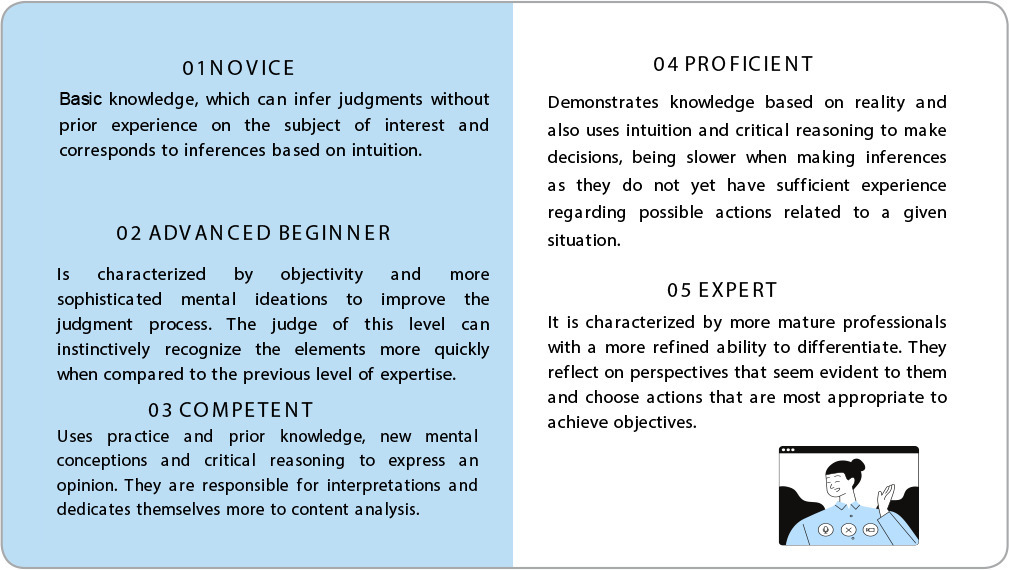
-
ORIGINAL ARTICLE07-29-2024
Sexual counseling for people with acute coronary syndrome: educational video development
Revista Brasileira de Enfermagem. 2024;77(3):e20230416
Abstract
ORIGINAL ARTICLESexual counseling for people with acute coronary syndrome: educational video development
Revista Brasileira de Enfermagem. 2024;77(3):e20230416
DOI 10.1590/0034-7167-2023-0416
Views0See moreABSTRACT
Objective:
to assess validity evidence of an educational video on safe sexual activity after acute coronary syndrome.
Method:
study in three phases: video development; content validity analysis by 11 experts; and analysis of validity based on response processes by seven people with coronary disease. The content validity ratio (CVR) was calculated with critical values for the second phase of 0.63 and for the third of 1.0.
Results:
the video addressed the importance of resuming sexual activity and positions that consume less energy, clinical warning signs, the importance of adhering to treatment and a welcoming environment for sexual practice. A CVR above the critical value was obtained with a total of 4 minutes and 41 seconds.
Conclusion:
the educational video brings together adequate content validity evidence and can be used as a tool for patients after acute coronary syndrome.
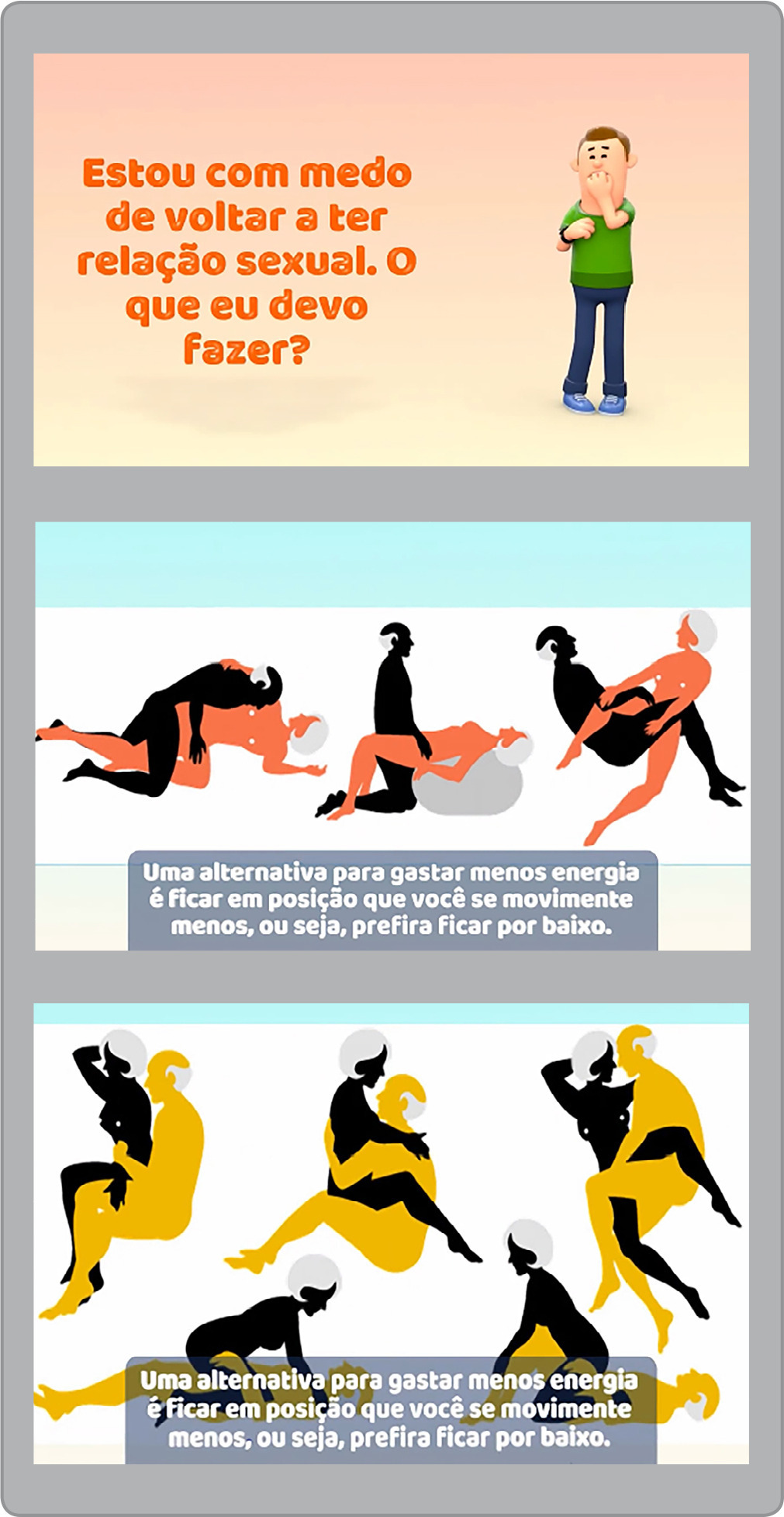
-
REVIEW07-29-2024
Utilization of local pressure devices in pain management during injections: scoping review
Revista Brasileira de Enfermagem. 2024;77(3):e20230399
Abstract
REVIEWUtilization of local pressure devices in pain management during injections: scoping review
Revista Brasileira de Enfermagem. 2024;77(3):e20230399
DOI 10.1590/0034-7167-2023-0399
Views0See moreABSTRACT
Objective:
to map scientific evidence regarding the use of local pressure devices in pain relief during injection procedures in patients.
Methods:
scoping review, following the recommendations of the JBI Manual for Evidence Synthesis and PRISMA-ScR, with searches conducted in the PubMed, EMBASE, CINAHL, LILACS, and PsycINFO databases, without temporal restrictions and with a cutoff date of March 2023.
Results:
a total of 1,514 studies were identified, with 20 articles included in the final sample. The ShotBlocker® device was utilized during subcutaneous and intramuscular injections in children and adults, proving beneficial in reducing pain, anxiety, and fear associated with the procedure.
Final considerations:
the ShotBlocker® is a low-cost, easy-to-use device that can enhance nursing clinical practice during painful procedures. However, studies involving the Brazilian Pikluc® device are scarce. Further research involving both local pressure devices is recommended.
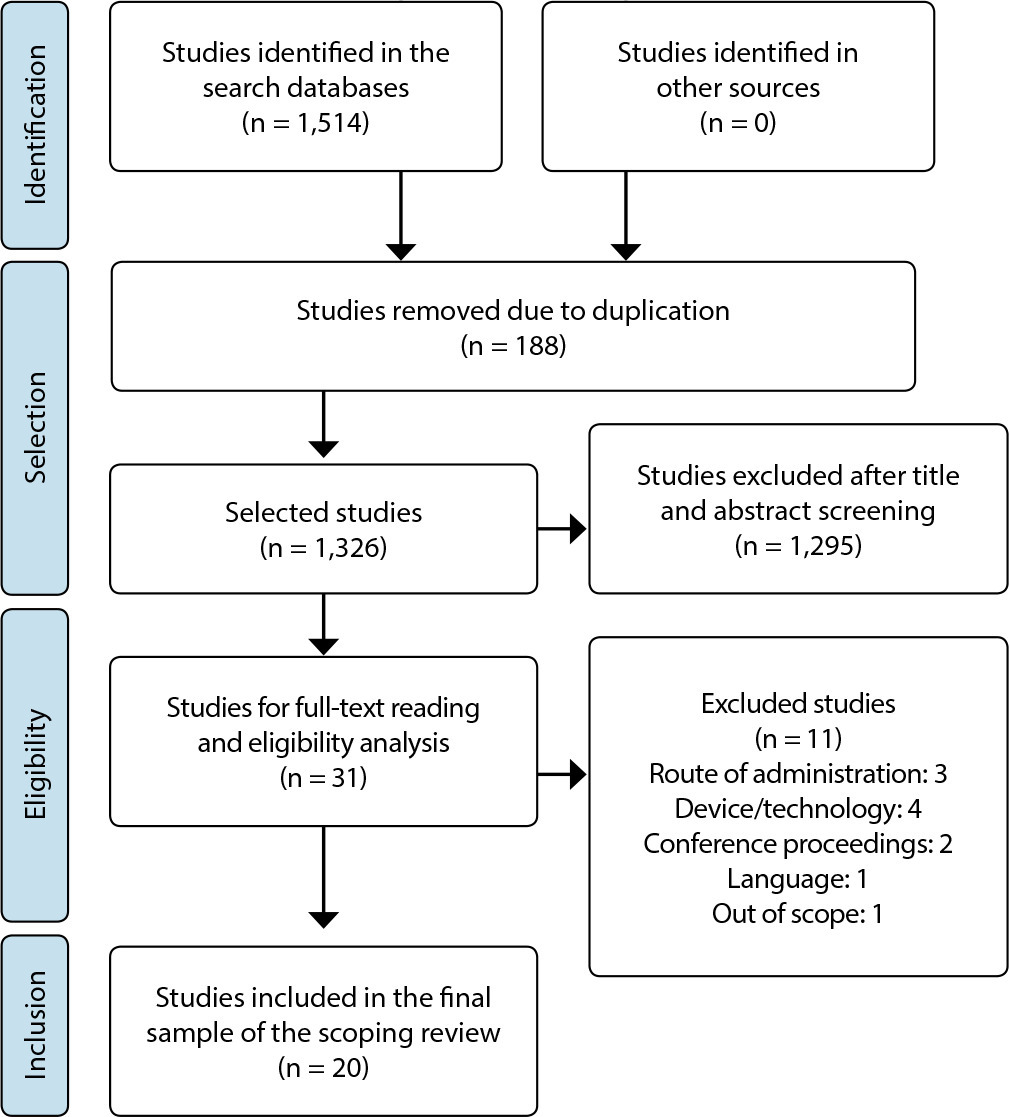
Search
Search in:
Nuvem de Tags
Adolescente (85) Atenção Primária à Saúde (239) COVID-19 (91) Criança (91) Cuidados de Enfermagem (269) Educação em Enfermagem (151) Educação em Saúde (139) Enfermagem (930) Enfermagem Pediátrica (86) Estudantes de Enfermagem (77) Estudos de Validação (131) Família (87) Idoso (208) Promoção da Saúde (99) Qualidade de Vida (104) Saúde do Trabalhador (86) Saúde Mental (145) Saúde Pública (82) Segurança do Paciente (150) Tecnologia Educacional (100)



